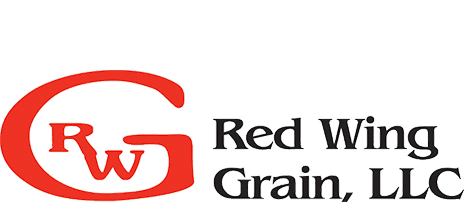Ag Partners and Western Wisconsin Nutrition hosted two Horse Owners Workshops (HOW) – one on Tuesday, March 6th in El Paso, WI and another on Thursday, March 8th in Cannon Falls, MN. Attendees had the opportunity to listen to Holly Rosner and Alesha Sveen from Purina Animal Nutrition discuss how to feed the individual horse, Dr. Toby Sheely taught about vaccinations and deworming practices, and Mike Koprowicz from Arena Trailer Sales, discussed giving your trailer a spring tune-up.
Holly Rosner, a Purina consultant, discussed how to feed the individual horse. Each horse is different, and therefore each horse should be fed according to their specific needs. When determining what to feed, we need to begin by looking at what forages are available, horse’s lifestyle, body condition score of the horse, our horse’s metabolism, and what changes you would like to see. Most horses can maintain their body weight and condition from the forages available to them; about 20 pounds of average quality hay will supply enough calories for maintenance of a 1,000-pound horse. This does not mean horses will eat just enough for maintenance and stop, an average horse will consume approximately 40-50 pounds of good quality hay or 30-40 pounds of moderate quality hay if fed free choice. This will supply an overabundance of calories, most likely resulting in feed & economic waste, as well as an overweight horse. However, forages often lack necessary nutrients like amino acids, vitamins, and minerals that allow the horse to live a long, healthy life. Amino acid balanced proteins target hair coat, muscle development, hoof growth and antibodies for immune response. Vitamins and minerals support immune function, bone density, and hoof growth and quality for the horse.

Purina has done numerous studies at their research farm to ensure that each feed has components that work effectively together and target specific needs for each individual horse. A race horse that needs short bursts of energy to the trail horse that gets ridden maybe once a week will need different diets to keep them healthy and in good shape. The race horse will need a higher carbohydrate (energy) content to give them that burst of energy when needed. The horse has trouble keeping weight on will need an extra fat supplement (condensed energy), where the trail horse that gets ridden once a week will need minimal fat and calories. The trail horse may just need a supplement, like Enrich Plus, to get balanced protein and the proper vitamins and minerals for maintenance.
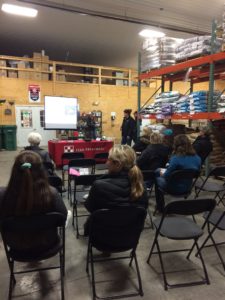
There are also feeds for horses that have special needs, like seniors or horses with Equine Metabolic Syndrome. Purina Senior is a complete feed that is specialized to allow the elder horses to live a long, healthy life. Purina WellSolve Weight Control (W/C) and WellSolve Low Starch and Sugar (L/S) are specific towards horses that have Equine Metabolic Syndrome, are prone to laminitis, or have restrictions of starch and sugar. Purina has a calculator on their website to help you determine what feed may be best for your horse and how much to feed. You can find it at www.purinamills.com in the horse section. It is important to remember to measure feed and hay by weight, not by volume.
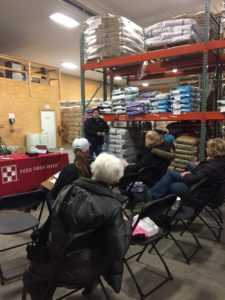
Some feeds are fluffier, like a texturized feed is fluffier than a pelletized feed because the pellets have been processed, formed, and are dense. There are millions of supplements out there, but feeding a teaspoon of this, a scoop of this, and two teaspoons of that does not mean those supplements are benefitting the horse. Those nutrients may be going through the horse, but many times various products do not work together and they may even tie up other nutrients if not fed in the appropriate ratios or “balance.” Feeding one balanced feed is usually the best way for the horse to get all of the necessary nutrients to live a long, healthy life.
Dr. Toby Sheely, an equine veterinarian from Stillwater Equine Veterinary Clinic, talked about how to properly vaccinate and deworm to allow your horse to live a long, healthy life. There are two different worming strategies that horse owners can follow; strategic deworming and traditional rotational deworming. Strategic deworming involves taking fecal samples to determine fecal egg counts. Fecal egg counts will represent what worms are present and shedding eggs and which horses carry higher amounts of worms. This information will allow you to worm each specific horse for their worm load because some will carry more than others. By targeting the high-shedding horses, you reduce the treatment required for the low-shedding horses, therefore exposing less parasites to deworming medications. Exposing parasites to deworming medications more often may lead to resistance.
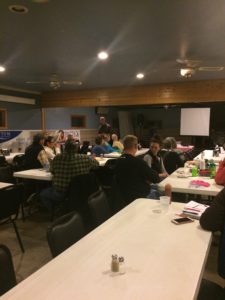
Traditional rotational deworming consists of using deworming medications with different active ingredients at certain times of the year to control parasites. This strategy does not require a fecal sample, rather assuming all horses carry the same parasite load. Large barns and boarding facilities may find this most convenient for them, but it may not be the best choice. Treating the high and low-shedding horses the same way has been thought to increase resistance in the parasites to our current deworming medications. People in the Midwest may not admit it much, but the winter is nice to have a break from things like flies and worms. The winter frost freezes and kills many parasites, which means we are less likely to see resistance to medications compared to southern states. Deworming will not eliminate parasites but will reduce the contamination of the eggs and larvae in the environment and maintain health in our horses.
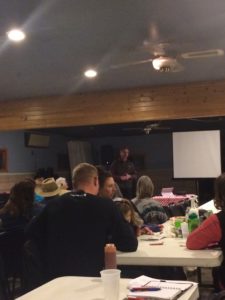
Vaccination protocols vary depending on your location, the activities with your horse, and their age. The most common viruses in the Midwest that we vaccinate for are tetanus, sleeping sickness, rabies, and West Nile. The 5-way vaccine covers most of these; eastern and western equine encephalomyelitis (sleeping sickness), influenza, rhino pneumonitis, and tetanus. West Nile is not much of a concern today as it was in 2004 because reports of the virus have significantly decreased. It is best to consult with your veterinarian regarding which vaccinations should be administered and what deworming medicine would be best.
Now that our horse is getting fed correctly, has the proper vaccinations and has been wormed, we need to think about being safe on the road. Mike Koprowicz from Arena Trailer Sales in Cannon Falls gave some tips about how to get your trailer road ready. There are many things to check on your trailer to be sure you and your horse are safe, and what better time to get a tune up than in the spring?
Visually observing the entire trailer is a good place to start. Check doors and windows for weather stripping and ensure the locking mechanisms are working properly. Walk along the roof to be sure there are no cracks and that all caulking and sealant is in good shape. The mechanical items to check are couplers, safety chains, brakes suspension, bearings and brakes, tires and air pressure, lights, and the breakaway battery and switch. Test the breakaway breaks, making sure the battery is working and will stop the trailer if it unhooks from the truck. If the brakes do not activate, it may be time for a new battery. It is important to be sure the cord for the breakaway breaks is connected directly to the truck, not the safety chains. This will ensure the brakes (which are in good working condition since you checked them) will activate if needed.
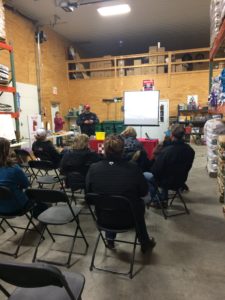
Keeping up with lubrication is necessary to have a long-lasting trailer. Lubricate all items, such as, door and window latches, any hinges, couple and divider hinges and latches.
Trailers that have living quarters should be thoroughly walked through; checking lights and electrical, filling the water tank and heater, rodent infestation, propane lines, turning on all appliances, and rolling out the awning. Open all drawers and cabinets, checking for signs of rodent infestation. For rodent control, place drier sheets throughout the living quarters to repel rodents and make it smell nice. If you do not feel comfortable doing a spring tune-up to your trailer, or just plain do not have time, talk to your local trailer dealer to see if they can do it. It is very important to keep your trailer well taken care of to ensure the safety of your horse, yourself, and those around you on the road.


